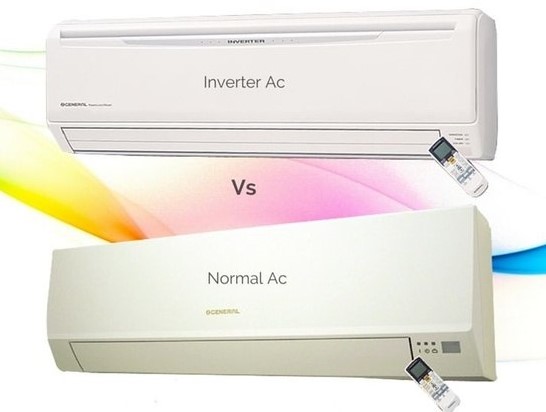Inverter vs Non-Inverter AC: Which one to buy?
With the onset of summer season of 2022, the foremost priority is to make your life comfortable by keeping the indoor temperature of your home or office cool by buying energy efficient air conditioner with faster cooling. In terms of power consumption, Inverter Airconditioners are more energy efficient and save around 40% to 50% on your electricity bills as compared to a normal split AC.
How does Inverter AC work?
An inverter converts frequency and this technology is used in many home and kitchen appliances to control electric voltage, current and frequency. An inverter type air-conditioner come with variable cooling/heating capacity by adjusting the compressor speed and controlling the refrigerant (gas) flow rate, thereby consuming less current and power. An air conditioner with inverter technology will operate continuously (as their compressors will be working all the time) but will draw only that much power which is required to maintain the desired temperature. Hence, its tonnage capacity will be automatically adjusted suiting the cooling needs of the room leading to lower monthly power bills. Though their initial cost is high but it gets compensated with lower running cost while operation. On the contrary, a non-inverter air conditioner have a fixed cooling/ heating capacity and can only control the room temperature by only starting or stopping their compressors. When the compressor stops, the power consumption and current goes down but at the time of restart, AC starts with full speed/cooling resulting in higher average power consumption and temperature variations.
However, even a BEE 3 Star Rated Inverter AC will be more efficient than a BEE 5 Star rated regular Air Conditioner. For instance, a 1.5 Ton Inverter AC can work from 0.5 to 1.5 ton based on the consumer’s cooling requirement whereas a Non-inverter 1.5 ton AC will work at a fixed capacity of 1.5 tonnage.
Why should you choose Inverter AC?
- Saves money : The operation of Inverter AC is based on inverter technology in which the compressor does not work at its full capacity all the time. At lower speed, the energy consumption is less hence saving upto 40% to 50% of power depending upon brand, model, EER rating chosen by the consumer. The major difference between the inverter and non-inverter AC is that the compressor runs and stops in normal AC whereas in inverter AC, it runs continuously at lower speed thus saving substantial amount on the electricity bills.
- Noiseless Operation : Since the compressor motor of the inverter air conditioner does not turn on and off all the time and keeps working at low power, the operation is very quite. On the other-hand, continuous on and off process in non-inverter air conditioner models result in lot of noise.
- Faster Cooling/Heating : Inverter AC cools the room at a much faster rate than its non-inverter counterpart as it runs at full power when the AC starts and gradually the power consumption reduces when it reaches the desired temperature.
- Eco friendly : In an inverter model, the cooling and heating is regulated in an energy efficient and seamless manner whereas in previous split ac older models, the electricity consumption is more irrespective of the amount of usage.
- Better Life Span : The latest inverter technology in DC inverter air conditioner models ensures steady and efficient cooling or heating solution as they operate on less power, work less hence reducing the wear and tear of the device, minimizing the sharp fluctuations and longer lifespan of the inverter ac.
- Smart Operation : You can control and analyse the energy consumption and usage of an inverter AC through PC and portable smart devices like smartphone. You can further review the technical metrics such as watts, voltages, current and units consumed. The consumer can also schedule the AC to turn it on or off automatically.
In terms of upfront cost, a 3 star rated inverter AC is more expensive than a 5-star rated normal AC but since its running cost is very low, the initial cost spent will be covered in terms of your electricity bill in long term. Comfort level, energy efficiency, power consumption, high performance, cooling capacity and money-saving properties are some of the benefits that make an inverter AC worth buying over normal non-inverter device.
Also Read : Top 5 best 1.5 ton Split ACs for your home
Which is better – Inverter AC or 5 Star rated Normal AC?
Higher the star rating of the split AC, higher will be its efficiency. Hence, 5 star rated normal AC will be most efficient but it will consume more electricity than a 3 star inverter AC. Thus if you compare the power consumption figures of both of them, then you will find that inverter AC scores over a higher rated non-inverter AC. They work on completely different principles. In regular AC, compressor runs on fixed speed whereas in inverter ac, compressor works on variable speed which is automatically adjusted according to the temperature of the room. This is the more efficient way of AC functioning.
Top 5 Inverter Air Conditioners below 40K are :
- Carrier 1.5 Ton 3 Star Inverter AC
- Voltas 1.2 Ton 5 Star Inverter AC
- Sansui 1.5 Ton Inverter 3 Star Split AC
- LG 1.5 Ton 3 Star Inverter Split AC
- Hitachi 1.5 Ton 3 Star 317HBEA Inverter AC
Also Read : LG launches new range of Dual Inverter ACs in India

